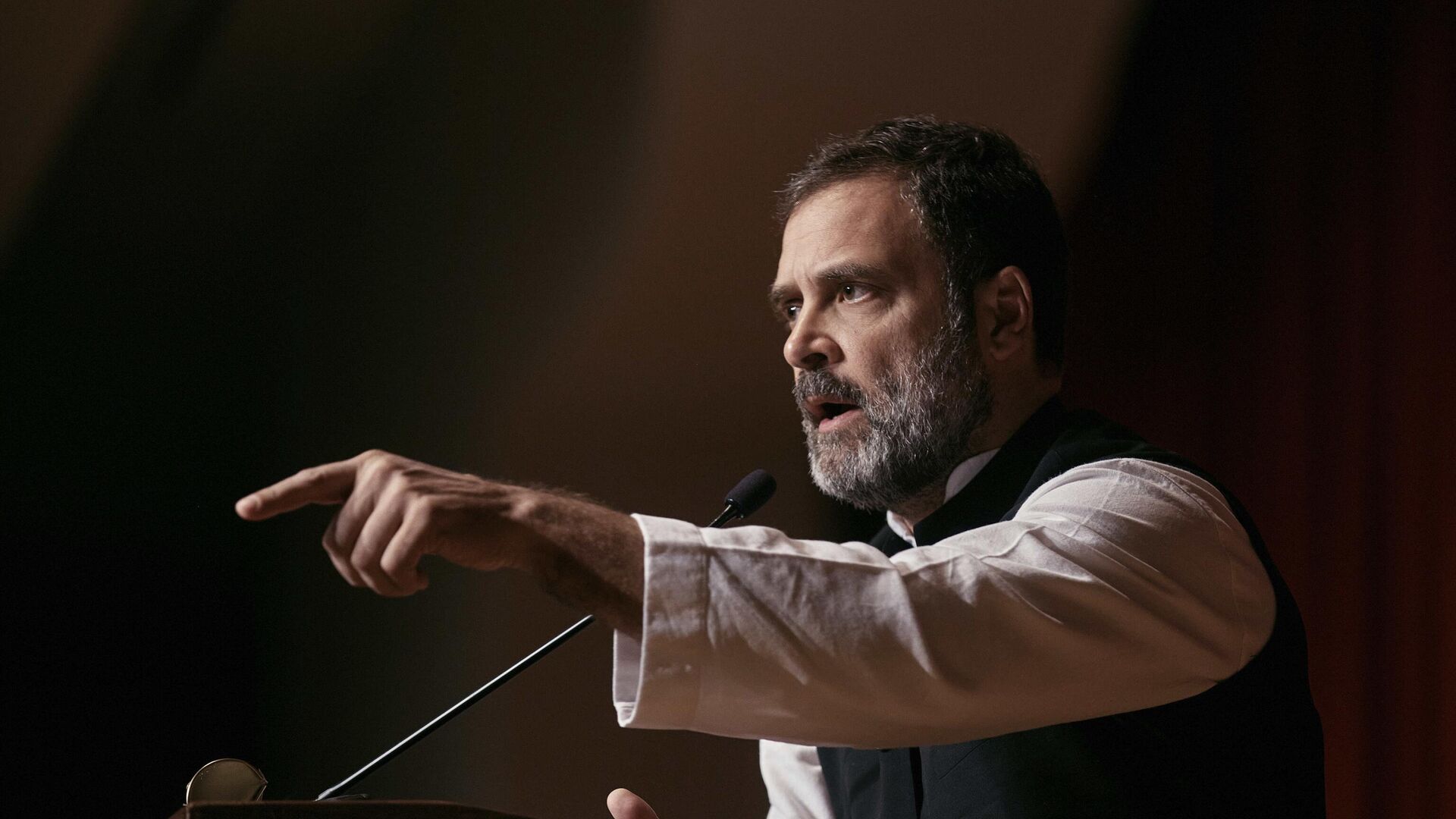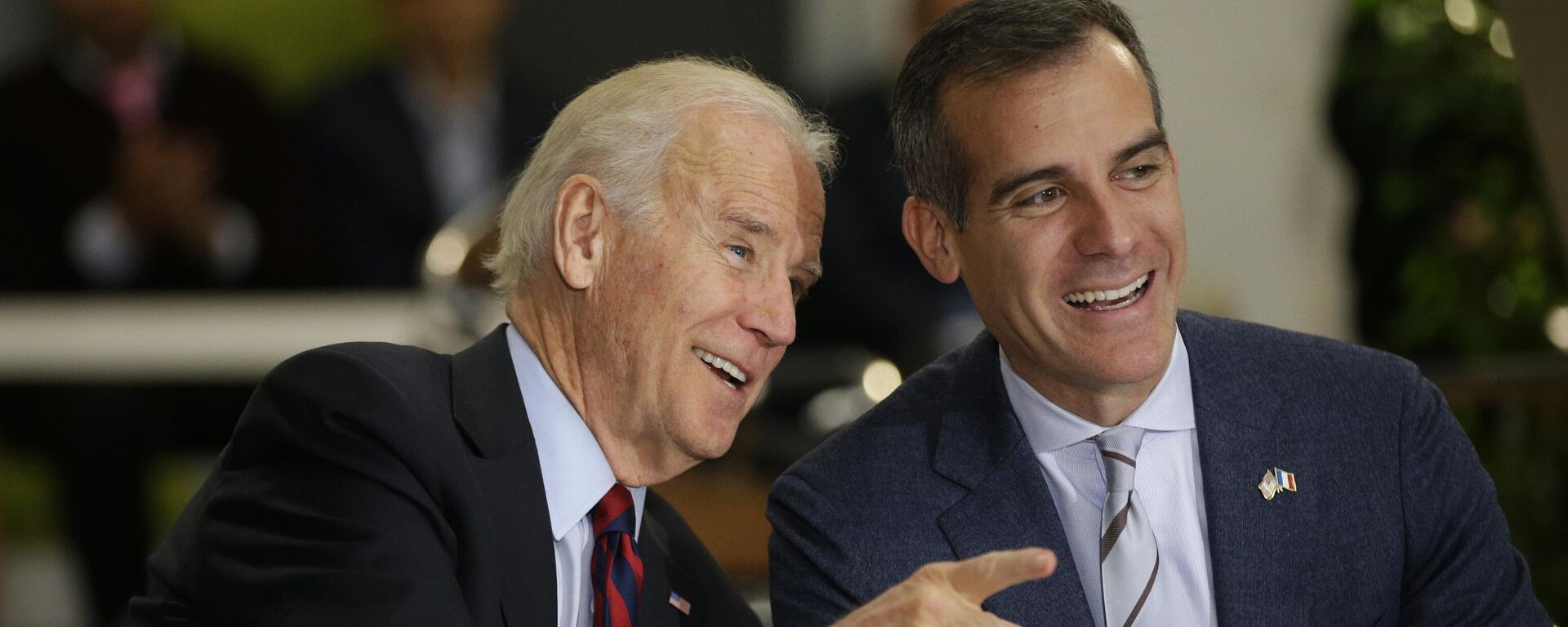https://sputniknews.in/20240903/is-a-caste-census-in-indias-national-interest-8099318.html
Is Caste Census in India's National Interest?
Is Caste Census in India's National Interest?
Sputnik India
Deep fissures have emerged in Indian polity over Leader of Opposition Rahul Gandhi's demand to formally revive the Socio-Economic and Caste Census (SECC), an exercise to enumerate the castes and sub-castes and their socio-economic conditions in India.
2024-09-03T20:32+0530
2024-09-03T20:32+0530
2024-09-04T14:34+0530
rahul gandhi
rajiv gandhi
jawaharlal nehru
india
bihar
bharatiya janata party (bjp)
karnataka
election interference
political crisis
political controversy
https://cdn1.img.sputniknews.in/img/07e7/09/0b/4191361_0:0:3072:1728_1920x0_80_0_0_3e32fa591daf7b324aefcb284ca337eb.jpg
Rahul Gandhi's demand to revive the Socio-Economic and Caste Census (SECC) has caused deep fissures in Indian politics.The Congress party's manifesto for the 2024 Lok Sabha elections highlights that historically underprivileged sections — Scheduled Castes (SCs), Scheduled Tribes (STs), and Other Backward Castes (OBCs) — account for nearly 70% of India's population. The party argues that these groups, despite being in the majority, have lagged behind in political and economic terms.However, many political observers are wary of holding a caste census, which was last last carried out by the British colonial authorities in 1931. The practice of classifying India's Hindu population by caste, initiated in the 1901 Census, is blamed for deepening societal divisions. An SECC was conducted in 2011 by the Congress-led government under former PM Manmohan Singh, but its findings were never released.Meanwhile, several state governments have held their own caste censuses in recent years. For example, the Congress-led Karnataka government in 2013 ordered a caste census but never released the findings. In contrast, the Bihar government led by BJP ally Nitish Kumar released its caste census findings last October.Following the concerns, Prakash Nanda, a Distinguished Fellow at Institute of Peace and Conflict Studies (IPCS) and editor of Uday India, criticized Rahul Gandhi's push for a caste census, warning it could harm national unity and economic growth.Nanda noted that India's first Prime Minister, Jawaharlal Nehru, discontinued the caste census in 1951 due to concerns about its impact on social cohesion. He also added that former Prime Ministers – Indira Gandhi and Rajiv Gandhi – also didn't back the idea, realising it would be fraught with dangers and play into the hands of India's enemies.Further, he suggested that Gandhi's plan might be influenced by external forces hostile to Prime Minister Modi.Meanwhile, the digital forensics group Disinfo Lab alleges that the revival of the caste census narrative was driven by French Indologist Christophe Jaffrelot, with alleged backing from American-Hungarian billionaire George Soros. According to their June report, Jaffrelot's 2021 research on the need for a caste census significantly influenced public discourse in India.Meanwhile, Nanda's thoughts were echoed by Alok Bansal, a Director at New Delhi-based think tank India Foundation.He recalled that former Prime Minister Rajiv Gandhi was aware of the dangers of reinforcing the caste system, which is why his government chose not to release the findings of the Mandal Commission (formed in 1979 by a predecessor to identify socially and educationally backward classes).On the other hand, Sanjay Jha, a supporter of Congress party and a former spokesperson, categorically rejected the charge that a caste census would create divisions in Indian society."The issue of caste census is an internal matter and got nothing do with trying to create any division at all. Indians come from different castes, which is a reality we live with. So, capturing such data should be a priority for any government," the expert asserted.He argued that capturing caste data is essential for addressing rising income inequality and social polarization. Jha emphasized the need for a detailed study to understand the socio-economic conditions of different castes and ensure equitable access to government services.
https://sputniknews.in/20240902/bangladesh-coup-re-ignites-us-regime-change-concerns-against-modi-8095022.html
india
bihar
karnataka
south asia
Sputnik India
feedback.hindi@sputniknews.com
+74956456601
MIA „Rossiya Segodnya“
2024
Dhairya Maheshwari
https://cdn1.img.sputniknews.in/img/07e6/0c/13/138962_0:0:641:640_100x100_80_0_0_2cb44360dbcdf6d84bf4b299cd045917.jpg
Dhairya Maheshwari
https://cdn1.img.sputniknews.in/img/07e6/0c/13/138962_0:0:641:640_100x100_80_0_0_2cb44360dbcdf6d84bf4b299cd045917.jpg
News
en_IN
Sputnik India
feedback.hindi@sputniknews.com
+74956456601
MIA „Rossiya Segodnya“
Sputnik India
feedback.hindi@sputniknews.com
+74956456601
MIA „Rossiya Segodnya“
Dhairya Maheshwari
https://cdn1.img.sputniknews.in/img/07e6/0c/13/138962_0:0:641:640_100x100_80_0_0_2cb44360dbcdf6d84bf4b299cd045917.jpg
caste census in india, caste census bihar, caste census rahul gandhi, caste census bihar, caste census in 2011, caste census karnataka, george soros rahul gandhi, george soros modi, modi news, modi speech, rahul gandhi news, rahul gandhi us visit, us regime change india
caste census in india, caste census bihar, caste census rahul gandhi, caste census bihar, caste census in 2011, caste census karnataka, george soros rahul gandhi, george soros modi, modi news, modi speech, rahul gandhi news, rahul gandhi us visit, us regime change india
Is Caste Census in India's National Interest?
20:32 03.09.2024 (Updated: 14:34 04.09.2024) There is a heated political debate in India over conducting a federal caste census, with Leader of the Opposition Rahul Gandhi demanding "Jitni Abadi, utna Haq" (rights proportionate to population). Critics, however, argue that the opposition seeks to divide Hindus, who form nearly 80% of India's population, along caste lines.
Rahul Gandhi's demand to revive the Socio-Economic and Caste Census (SECC) has caused deep fissures in Indian politics.
The Congress party's manifesto for the
2024 Lok Sabha elections highlights that historically underprivileged sections — Scheduled Castes (SCs), Scheduled Tribes (STs), and Other Backward Castes (OBCs) — account for nearly 70% of India's population. The party argues that these groups, despite being in the majority, have lagged behind in political and economic terms.
However, many political observers are wary of
holding a caste census, which was last last carried out by the British colonial authorities in 1931. The practice of classifying India's Hindu population by caste, initiated in the 1901 Census, is blamed for deepening societal divisions. An SECC was conducted in 2011 by the Congress-led government under former PM Manmohan Singh, but its findings were never released.
Meanwhile, several state governments have held their own caste censuses in recent years. For example, the Congress-led Karnataka government in 2013 ordered a caste census but never released the findings. In contrast, the Bihar government led by BJP ally Nitish Kumar released its caste census findings last October.
Home Minister Amit Shah has indicated that the central government is not opposed to the caste census but cautioned against politicizing the issue. The RSS, the BJP's ideological parent, has also supported the demand but warned against using it as a political tool.
Following the concerns, Prakash Nanda, a Distinguished Fellow at Institute of Peace and Conflict Studies (IPCS) and editor of Uday India, criticized Rahul Gandhi's push for a caste census, warning it could harm national unity and economic growth.
Nanda noted that India's first Prime Minister, Jawaharlal Nehru, discontinued the caste census in 1951 due to concerns about its impact on social cohesion. He also added that former Prime Ministers – Indira Gandhi and Rajiv Gandhi – also didn't back the idea, realising it would be fraught with dangers and play into the hands of India's enemies.
Further, he suggested that Gandhi's plan might be influenced by external forces hostile to Prime Minister Modi.
"There is a likelihood that it came from certain vested Western elements who are inimical to Prime Minister Modi. Many people don't realise that even Indian Constitution's architect Dr BR Ambedkar wanted to eventually do away with reservations (affirmative action) in government jobs, while Rahul Gandhi is seeking to increase the cap to above legally-mandated 50%," he said.
Meanwhile, the digital forensics group Disinfo Lab alleges that the revival of the
caste census narrative was driven by French Indologist Christophe Jaffrelot, with alleged backing from American-Hungarian billionaire George Soros. According to their June report, Jaffrelot's 2021 research on the need for a caste census significantly influenced public discourse in India.
Meanwhile, Nanda's thoughts were echoed by Alok Bansal, a Director at New Delhi-based think tank India Foundation.
"The youth of the country, especially the urban youth, don't want to identify with an anachronistic institution like caste. The caste census entrenches these identities rather than obliterating them which is required," Bansal told Sputnik India.
He recalled that former Prime Minister Rajiv Gandhi was aware of the dangers of reinforcing the caste system, which is why his government chose not to release the findings of the Mandal Commission (formed in 1979 by a predecessor to identify socially and educationally backward classes).
"The fact of the matter is that a caste census is not in the nation's interest. We can't perpetuate the SC/ST/OBC identities forever. That is what the founding fathers of our country, be it Jawaharlal Nehru or Mahatma Gandhi advocated," Bansal said.
On the other hand, Sanjay Jha, a supporter of Congress party and a former spokesperson, categorically rejected the charge that a caste census would create divisions in Indian society.
"The issue of caste census is an
internal matter and got nothing do with trying to create any division at all. Indians come from different castes, which is a reality we live with. So, capturing such data should be a priority for any government," the expert asserted.
He argued that capturing caste data is essential for addressing rising income inequality and social polarization. Jha emphasized the need for a detailed study to understand the socio-economic conditions of different castes and ensure equitable access to government services.
"If we don't do that, India will continue to witness large income inequality for a long time to come. And if you go by the Bihar caste survey being symptomatic of the larger Indian story, where 70-80% of the state's population was found to be belonging to OBC/SC/ST segments. We can't ignore that section of the population, otherwise it raises question on the India's growth story," Jha concluded.



